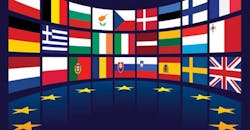EU Pushes Quick Japan Trade Deal in Face of US 'Protectionism'
The EU said on April 18 it was leading the defense of free trade in the face of US "protectionism" as it unveiled plans to fast-track deals with Japan and Singapore.
The European Commission proposals to push through the trade pacts by next year come as Brussels is at loggerheads with Washington over President Donald Trump's tariffs on steel and aluminum.
"They send a strong signal to the world that the EU is committed to open rule-based trade," EU Trade Commissioner Cecilia Malmstroem told a press conference in Strasbourg, France.
"We are willing to take that leadership," the Swedish commissioner said on the sidelines of a European Parliament session.
The commission, the executive arm of the European Union, has concluded draft deals with Japan and Singapore, but the 28 EU states have yet to formally approve them.
It proposes that member states should approve them directly, thereby avoiding votes in national parliaments that nearly derailed a pact with Canada.
Malmstrom had just described Trump's tariffs on steel and aluminum as "pure protectionism" that breach the rules of the World Trade Organization.
But she said support for "good, win-win trade agreements is growing in the world," with the EU also close to striking trade deals with Australia, Mexico and Latin America's Mercosur trade bloc.
The deal that EU negotiators concluded with Japan in December will form the world's biggest economic area of more than 600 million people while the one with Singapore is seen as a "stepping stone" to Southeast Asia.
Malmstroem said she hoped now for "quick handling" of the deals by the member states, saying it was "realistic" to do so before the five-year mandate of Jean-Claude Juncker's commission expires in mid-2019.
Before they are signed, she said, the deals will also have to be endorsed by the legislatures in Japan and Singapore, but "this can happen by the end of the year".
The trade agreements with Japan and Singapore do not face the additional hurdles of having to be ratified by the EU national parliaments.
They do not contain clauses on investment protections that nearly derailed a trade pact with Canada two years ago when Belgium's regional parliament of Wallonia threatened to veto the whole deal.
However, a separate investment protection agreement with Singapore must be ratified by EU countries.
Critics have alleged that clauses to protect powerful international investors could force governments to change laws against the wishes of the people.
Under the Japan deal, the EU will open its market to the world-leading Japanese auto industry, with Tokyo in return scrapping barriers to EU farming products, especially dairy products.
Copyright Agence France-Presse, 2018
